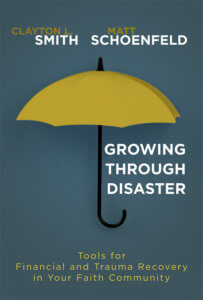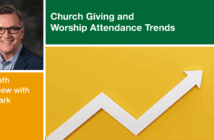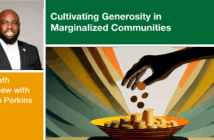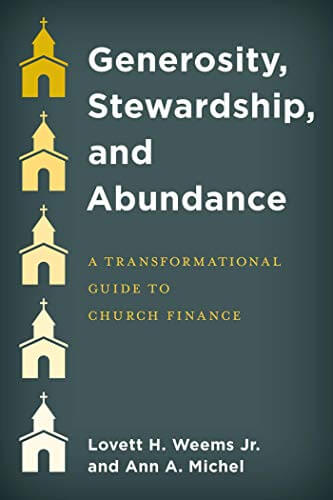Nearly half of congregations say stewardship is the biggest challenge they face as a result of the COVID-19 crisis. Stewardship expert Clayton Smith says churches can bounce back and suggests three ways to move forward with sustained generosity.
Lake Institute of Faith & Giving recently surveyed church leaders about Faith and Giving in the Time of COVID-19. Nearly half of the respondents stated that “stewardship would be their most significant challenge for recovery.” Also noted were the ongoing priorities of teaching stewardship and nurturing generosity.
Certainly, church leaders are now more aware of many new demands and limitations on the local church caused by the health concerns of this pandemic. Yet, it is difficult to predict the short- and long-term financial stewardship implications. But it is clear that stewardship and generosity ministry must adapt and change.
1. Focus on pastoral care.
What are the early financial indicators, needs, and demands for your local church? What are the vital signs of online worship attendance? Most local church pastors I know are reporting a great increase of focus on pastoral care. Online worship is calling for greater focus and development by pastors, staff, and volunteers. Worship and pastoral care call for immediate attention.
However, it is essential that resetting stewardship ministry becomes foundational for your church’s response. Of course, increased communication with members and your community is vital. Many pastors suggest that their communication has doubled to insure member connection and care in this time of isolation. Some churches have reopened for worship with social distancing, masks, and other restrictions. Church leaders are now asking how we can better know and serve our members’ needs.
Begin by developing a survey to discover the top needs of the people in your congregation. Some may be struggling with unemployment. Others may identify as financially insecure and desperate for ways to better manage their debt and budget needs. Depending on what you hear, you may consider offering classes, workshops, and/or other learning opportunities. You might consider establishing a financial coaching ministry. Be sure to redesign your annual stewardship campaign based on the felt needs of your people! Make it clear that this campaign is not about what the church wants from your members, but what the church wants for your members.
Online worship has already changed us. Our approach to pastoral care is changing to meet the crisis needs. Now is the time to also develop new approaches to financial education. Offer practical budgeting tools on your website to help your members become better money managers. Proactive financial stewardship preaching/teaching are now more essential for financial resilience! For example, you might preach a stewardship sermon series on a topic like, “Reset: Biblical Wisdom for Challenging Economic Times.” In my experience, people want to learn more about the wise use of money. Organize new and revitalized small group/class ministries to teach money management, reignite hope, healing, and long-term generosity.
2. Develop a financial recovery plan.
To reset your stewardship ministry, develop your strategic financial stewardship recovery plan. First, reset your financial needs in light of the pandemic. Audit your recent giving. Also, audit your total giving in the last three to five years. It is very important to know all areas of giving in the past. Then you can reset your budget one year at a time. Agree on your measurable and immediate goals. It is wise to monitor and be able to reset your budget every three to six months, if necessary. Timely flexibility is vital. Stay positive. It may take three years to recover.
Keep your plan clear, concise, and compelling. It need not be longer than one page. Center your stewardship efforts on communicating the church’s purpose, vision, and mission. Plan on regular stewardship communication with your members, visitors, and donors throughout the year. I share more about this in my book, Propel: Good Stewardship, Greater Generosity (Abingdon Press, 2015), where I detail my church’s financial recovery and growth following the great recession.
3. Know that relationships matter.
Remember that relationships matter most. Generosity happens when there is trust and clear vision for the ministry of the church. Disaster and disease isolate. Financial recession and unemployment compound our crisis. Racial injustice and political conflict divide. The healing ministry role of the local church has never been greater in our communities!
I believe that most of our faith communities can and will recover from pandemic disaster. Some churches will even grow stronger. The church can be a healing place as we offer hope-filled trauma care ministry. The crisis calls for a resilient stewardship ministry. What will your faith community look like in the months and years ahead? I believe this crisis creates a defining moment of opportunity now for you and your church leaders. “But those who hope in the Lord will renew their strength” (Isaiah 40:31).
This article originally appeared in Luther Seminary’s Stewardship Leaders Newsletter Issue #12, July 21, 2020. Used by permission.
Related Resources
 Growing Through Disaster: Tools for Financial and Trauma Recovery in Your Faith Community (Abingdon Press, 2019) by Clayton Smith and Matt Schoenfeld
Growing Through Disaster: Tools for Financial and Trauma Recovery in Your Faith Community (Abingdon Press, 2019) by Clayton Smith and Matt Schoenfeld- COVID-19 Reminds Us of Crucial Church Finance Safeguards by Lovett H. Weems Jr.
- 7 Ways to Keep Revenue and Donations Flowing During the COVID-19 Crisis by Rob Blezard







